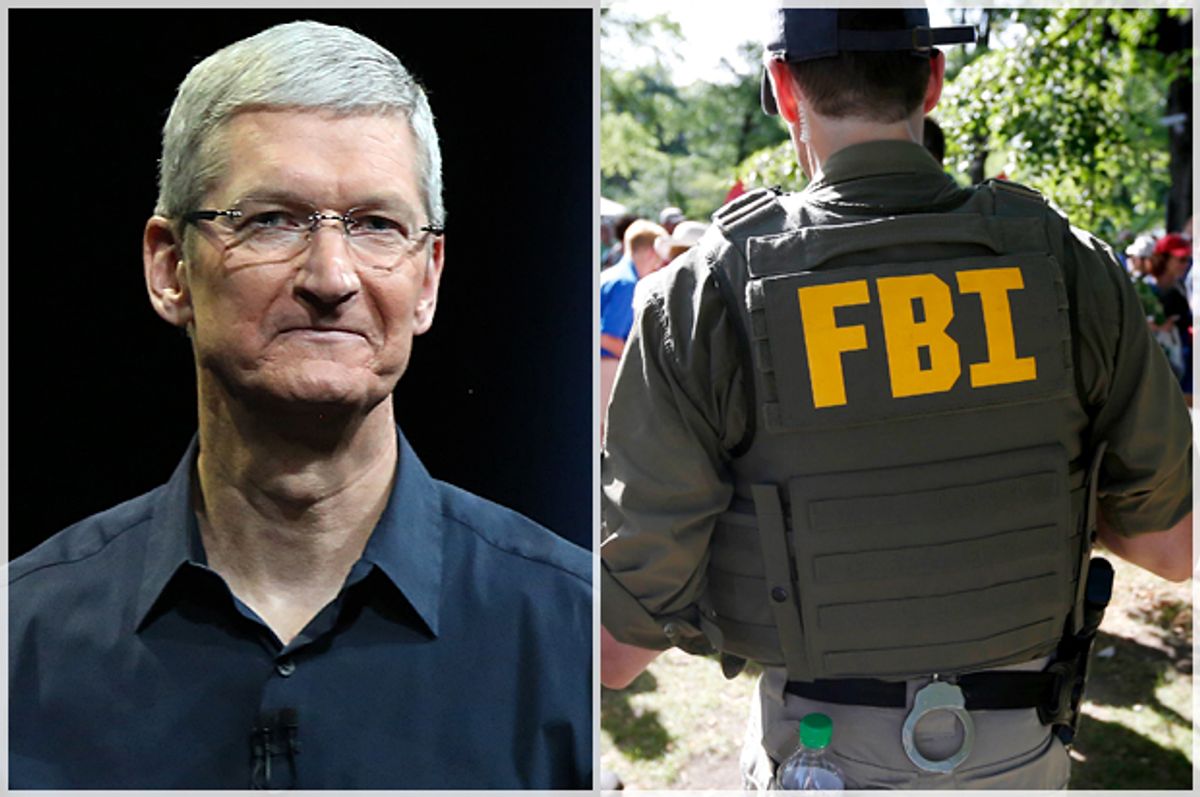In justifying their efforts to get into San Bernardino shooter Syed Farook's iPhone, the FBI is now using the same logic that the CIA used to justify torturing people who had no information to share.
From the start of the FBI's efforts to get into Farook's phone, it was fairly clear there'd be nothing on it. What kind of terrorist, planning to attack his co-workers at a holiday party, would coordinate his planning on his work-issued phone? Plus, Farook went to some lengths to make data on his other devices unavailable. He destroyed two personal cell phones and successfully hid a hard drive. That he didn't make the same effort with his work phone should have been the tip off for the nation's top law enforcement agency that there would be nothing there.
Over the course of the FBI's legal effort to force Apple to disable security features in order to make it easier for them to crack the phone, the DOJ released additional details that made it clear that the government should have known Farook wasn't hiding anything on the device. For example, Farook could have deleted all his backups from the same screen he would have used to disable backups, but he didn't do so. It even became clear that the FBI wasn't looking at the right screens of the iPhone to figure out whether Farook turned off his backups.
"Agent Pluhar...was not looking at the settings that govern the iCloud backups," Apple's privacy manager said in a declaration filed in the case.
Ultimately, Apple never had to help FBI crack the phone. Just before a hearing in the case at which FBI agents might have been asked why they screwed up several other details pertaining to the phone, the DOJ announced it had found another way into the phone. The Washington Post has since revealed that hackers provided a vulnerability allowing the FBI to break into the phone without Apple's cooperation.
That has left the FBI secretly leaking admissions that they found nothing on the phone, along with rationalizations for why it still made sense to ask a judge to force Apple to write a custom version of its operating system to help it break into a phone that clearly had no useful evidence on it.
Among the crazier explanations -- also leaked to the Post -- is that they wanted to check for geolocation data to see if they could fill in an 18 minute gap in the FBI's timeline of the killers' day. Not only would the FBI have been able to get that data from the telecom, rather than Apple; this reasoning would also suggest that Farook had his work phone on him, but then went out of his way to leave it in a car not used the day of the attack.
But the FBI exhibited a new type of desperation in its attempt to justify cracking the phone when it told CNN earlier this week that "[t]he phone didn't contain evidence of contacts with other ISIS supporters or the use of encrypted communications during the period the FBI was concerned about." CNN's anonymous sources continued, "The FBI views that information as valuable to the probe, possibilities it couldn't discount without getting into the phone."
In other words, the FBI was justified for making an expansive demand on Apple because it discovered the absence of evidence.
That's the same kind of argument the CIA often used after it tortured people to force them to give up information they didn't have. In 2004, for example, the CIA got the torture program reinstated so it could subject suspected Afghan militant Gul Rahman to sleep deprivation, slaps, stress positions, and other torture techniques, all because a fabricator said he had evidence about an election year threat. Once the CIA admitted that Gul had no evidence -- but only after the DOJ had reauthorized all previously approved forms of torture, including waterboarding -- the agency explained it away by saying that "enhanced interrogation techniques were required for Gul to deny the existence of the threat."
Mind you, in both cases the government had evidence that should have told them they'd find no evidence once they used extraordinary methods to obtain that lack of evidence. In the CIA's case, an officer had already raised doubts about the election-year threat for a number of reasons. Ultimately, they were even able to get the fabricator to admit he had lied. Likewise, in the case of Farook's phone, the FBI already had all the metadata it needed to ensure Farook wasn't in contact with ISIS supporters.
(The FBI and other intelligence agencies do routinely use the absence of communication as "evidence" that terrorists used encryption, even though that makes no technical sense.)
But those alternative sources of evidence never seem to matter. When spooks and cops want to gain expansive new powers, apparently, they can do so even just to prove the absence of evidence.

Shares